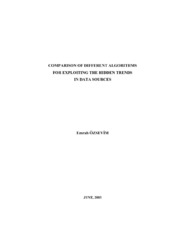Please use this identifier to cite or link to this item:
https://hdl.handle.net/11147/3785Full metadata record
| DC Field | Value | Language |
|---|---|---|
| dc.contributor.advisor | Püskülcü, Halis | en |
| dc.contributor.author | Özsevim, Emrah | - |
| dc.date.accessioned | 2014-07-22T13:52:21Z | - |
| dc.date.available | 2014-07-22T13:52:21Z | - |
| dc.date.issued | 2003 | en |
| dc.identifier.uri | http://hdl.handle.net/11147/3785 | - |
| dc.description | Thesis (Master)--Izmir Institute of Technology, Computer Engineering, Izmir, 2003 | en |
| dc.description | Includes bibliographical references (leaves: 92-97) | en |
| dc.description | Text in English; Abstract: Turkish and English | en |
| dc.description | 97 leaves | en |
| dc.description.abstract | The growth of large-scale transactional databases, time-series databases and other kinds of databases has been giving rise to the development of several efficient algorithms that cope with the computationally expensive task of association rule mining.In this study, different algorithms, Apriori, FP-tree and CHARM, for exploiting the hidden trends such as frequent itemsets, frequent patterns, closed frequent itemsets respectively, were discussed and their performances were evaluated. The perfomances of the algorithms were measured at different support levels, and the algorithms were tested on different data sets (on both synthetic and real data sets). The algorihms were compared according to their, data preparation performances, mining performance, run time performances and knowledge extraction capabilities.The Apriori algorithm is the most prevalent algorithm of association rule mining which makes multiple passes over the database aiming at finding the set of frequent itemsets for each level. The FP-Tree algorithm is a scalable algorithm which finds the crucial information as regards the complete set of prefix paths, conditional pattern bases and frequent patterns by using a compact FP-Tree based mining method. The CHARM is a novel algorithm which brings remarkable improvements over existing association rule mining algorithms by proving the fact that mining the set of closed frequent itemsets is adequate instead of mining the set of all frequent itemsets.Related to our experimental results, we conclude that the Apriori algorithm demonstrates a good performance on sparse data sets. The Fp-tree algorithm extracts less association in comparison to Apriori, however it is completelty a feasable solution that facilitates mining dense data sets at low support levels. On the other hand, the CHARM algorithm is an appropriate algorithm for mining closed frequent itemsets (a substantial portion of frequent itemsets) on both sparse and dense data sets even at low levels of support. | en |
| dc.language.iso | en | en_US |
| dc.publisher | Izmir Institute of Technology | en |
| dc.rights | info:eu-repo/semantics/openAccess | en_US |
| dc.subject.lcc | QA76.9.D343 O97 2003 | en |
| dc.subject.lcsh | Data mining | en |
| dc.subject.lcsh | Association rule mining | en |
| dc.subject.lcsh | Algorithms | en |
| dc.title | Comparison of different algorithms for exploting the hidden trends in data sources | en_US |
| dc.type | Master Thesis | en_US |
| dc.institutionauthor | Özsevim, Emrah | - |
| dc.department | Thesis (Master)--İzmir Institute of Technology, Computer Engineering | en_US |
| dc.relation.publicationcategory | Tez | en_US |
| item.languageiso639-1 | en | - |
| item.fulltext | With Fulltext | - |
| item.openairecristype | http://purl.org/coar/resource_type/c_18cf | - |
| item.openairetype | Master Thesis | - |
| item.grantfulltext | open | - |
| item.cerifentitytype | Publications | - |
| Appears in Collections: | Master Degree / Yüksek Lisans Tezleri | |
Files in This Item:
| File | Description | Size | Format | |
|---|---|---|---|---|
| T000258.pdf | MasterThesis | 1.24 MB | Adobe PDF |  View/Open |
CORE Recommender
Page view(s)
72
checked on Jul 22, 2024
Download(s)
44
checked on Jul 22, 2024
Google ScholarTM
Check
Items in GCRIS Repository are protected by copyright, with all rights reserved, unless otherwise indicated.